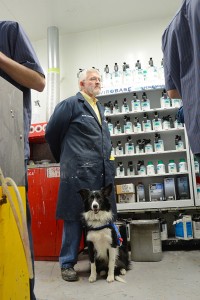“Jesse” (his full name is Jesse James, of Wild West fame) is the service dog of Alfred M. Thomas II, associate professor of collision repair. Following a diagnosis of post-traumatic stress disorder and certification through the Veterans Administration, Thomas obtained approval to have Jesse with him at work via the Americans with Disabilities Act. The young border collie arrived on the scene last year.
In a place where the restoration of automobiles is the key concentration, other forms of restoration are occurring deeper, below the surface.

Jesse offers his owner the simple joys of companionship, calm and contentment. The devoted dog appears to love his work. He also loves routine. Each morning, when the duo arrives at the College Avenue Labs, Jesse walks the hallway, greeting faculty members in nearby offices (and getting treats from some). He also stands in the hallway, receiving greetings from students passing by on their way to class.
Ryan J. Levesque, a graduate of the business administration: small business and entrepreneurship concentration major and a current student in automotive restoration technology, said: “Jesse’s calm. You couldn’t have (other breeds of dogs) in here; they’d be jumping all over everything. We’re just used to him. He’s good at remembering faces. He’s used to us. If a new person is in the lab, he’s curious about them.”
Indeed, the dog is vigilant in lab, surveying activities and sensing his owner’s needs. Jesse is typically right by Thomas’ side or, sometimes, lying across his feet, relieving any perceived anxiety.
“It’s very reassuring and calming; there’s a sense of ‘I’ve got your back,’” shared Thomas, noting studies that indicate PTSD service dogs lower their owners’ blood pressure and help them live longer.
A Vietnam veteran, Thomas’ PTSD diagnosis was late in arriving, even though he is an Agent Orange-exposed veteran and annually visits a veterans clinic. His symptoms were initially spotted by his daughter, Susanna, a 2003 physician assistant graduate of Penn College. After graduation, she began working in federal clinics and soon recognized her father’s PTSD symptoms and encouraged him to pursue further testing.
“I knew I was traumatized when I came back from Vietnam, but at the time, it wasn’t recognized,” said Thomas, who served two tours of duty from 1968 to 1970. “Back then, people weren’t socially accepting of a grown man with PTSD. The post-Vietnam society was not open to it like they are now.”
Thomas says many sufferers of PTSD are highly successful in their jobs, “They just keep the symptoms down by being workaholics.”
The college professor is certainly among that prolific group. A nationally recognized expert in the collision repair arena, Thomas is a contributing editor for Auto Body Repair News; the magazine has published 75 of his articles in the past seven years. He’s also a bestselling author, having co-authored a leading textbook used in secondary and postsecondary education: “Collision Repair and Refinishing: A Foundation Course for Technicians.” Published in 2009 by Delmar Cengage Learning, the popular publication has already been updated with a second edition just this year.
A master certified collision repair refinishing technician and an I-CAR platinum technician, Thomas says he has one of the largest collections of collision repair images and enjoys regularly sharing photos via social media.
“I’ll post a photo and someone will ask, ‘What kind of paint gun did you use in that picture?’ so I’ll reply with the information,” he explained.
“For a 65-year-old man, I’m one of few older guys who’ve embraced the technology of social media,” he said. “I like to keep in touch with my family and also with my students. I like to know what things they’re doing, and I like to wish them Happy Birthday.”
He noted he’s also accessible to his students via texting and email.
It’s his connections with students that Thomas will miss most when he retires at the end of the 2013-14 academic year.
“When I retire, I can continue to paint cars, but what will be hard to leave is all those nice kids out there,” he said, sitting in his office while Jesse rested under the desk.
Upon retirement, Thomas will return to his native Michigan, the state that stirred his interest in the automobile.
“Growing up in Michigan certainly influenced my career,” he said, mentioning that he deeply appreciates the social and economic history of the automobile and its role in our country’s narrative.
“Falling in love with the automobile came to me naturally,” Thomas said. “I understand how they work; I understand how to fix them. I had to have something I’m good at – and it turned out to be cars. Some careers you find; some careers find you. I think this one found me.”
Thomas plans to continue working on vehicles, as well as working on his family’s farm, producing a variety of certified organic products including hops, honey and artisan cheeses.
Roaming at the farm are Jesse’s three siblings, who are also being trained as service dogs. Thomas says the dogs will most likely go to Gulf War veterans, adding there’s always a waiting list for service dogs.
“It’s an emerging therapy,” Thomas said of PTSD service dogs, adding: “The people get trained more than the dogs. The dogs pick up things instinctually.”
To learn more about the major, visit the collision repair web page.
For more about Penn College, which will mark 100 years as an educational institution of national reputation in 2014, email the Admissions Office or call toll-free 800-367-9222.
